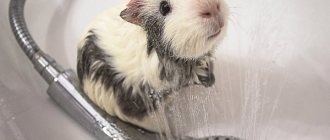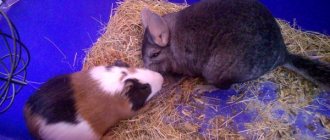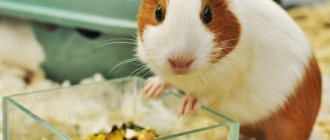Many people want to have two or more pets at home. Most often we are talking about one species, but there are exceptions, and then a guinea pig and a cat can meet in the same house.
A calm atmosphere at home is important for every pet; it is important for them to get along peacefully with all family members and with other animals, or at least just treat each other neutrally. Therefore, before bringing such animals into your home at the same time, study some of the features of their cohabitation.
Guinea pig and cat: is friendship possible?
Speaking about the joint keeping of such different animals as a guinea pig and a cat in the same house, first you need to pay special attention to the individual characteristics of the cat's temperament.
Peaceful coexistence is possible if the cat has a soft and calm temperament without a developed hunter instinct. Such animals calmly tolerate the company of a rodent, even allowing it to crawl on itself or, having shown curiosity at first, then simply ignore it.
There are known cases when a cat mistook a rodent for a kitten and showed maternal feelings towards it, licking it, feeding it and carrying it around by the scruff of the neck.
Such relationships are rare; more often, peace-loving felines, after meeting a guinea pig, quickly lose interest in it and even sleep in the rodent’s cage. If the animal’s hunter’s instinct is highly developed, it will immediately discern a potential victim in the rodent and begin to attack it.
Most often, cats quickly lose interest in a guinea pig.
How to make friends between a cat and a guinea pig
- The first step when purchasing a guinea pig is to isolate it from the cat and let it get used to it. Later, feed the cat to his fill and invite him to meet his new neighbor. Bring him into the room with the rodent and, while talking calmly, sit both on your knees. Pet your pets and carefully observe their behavior. If one of them is frightened, immediately interrupt the meeting and reschedule the next attempt at meeting the next day;
- If the cat shows a willingness to communicate peacefully with the rodent, the first meeting will go smoothly. In other cases, do not rush the animals, stretching out the process of them recognizing each other for days or even weeks;
- If the pets are accustomed to the smells and presence of each other, and the cat calmly accepts the new neighbor, allow the small animal to run freely around the room. Let your mustachioed pet watch the moving animal from your lap. If during a rodent walk the cat presses down and puts its ears back, be sure to intervene and prevent an attack on the pig;
- assign each animal its own feeding place; do not feed them in one place;
always carefully lock the cage with a secure latch
Cats are smart animals that can handle a simple bolt or hook; Do not deprive your old pet of attention when a new animal appears in the same apartment. It is the lack of attention of the owner that most often offends the animal; it quickly figures out the culprit of the situation and often tries to eliminate him; play outdoor games with your cat, let him spend as much energy as possible
Then, in his free time from games, he will rest peacefully, without wasting his energy trying to hunt a new guest; If the cat shows obvious hunting skills, do not scold or punish him. Try to distract him from the rodent, show your attitude towards him, letting the cat know that he remains your favorite; No matter how friendly a cat is, you should not leave your pets alone.
Actions during a fight
Guinea pigs fight fiercely and can hurt each other and their owner. During the meeting and check-in process, a person should prepare a towel in case they have to separate the rodents. It is strictly forbidden to intervene with bare hands; animals react aggressively to humans.
Two guinea pigs will be wary of each other. At the first meeting, everyone should sniff their friend, this is how the rodents get to know each other.
Chatting teeth, ruffled fur, chasing and persecution should not be stopped. Pigs determine the hierarchy in a pair. Until the animals figure out who is in charge, they will not be able to find a common language.
At the beginning of the acquaintance, pigs should establish a hierarchy
If a fight breaks out between rodents:
- You can knock loudly near the cage so that the sharp sound distracts the animals;
- It helps to spray the ball with warm water from a spray bottle;
- separate by hand, through thick fabric, or with rough gloves.
After a conflict, pigs should be housed in different rooms for several weeks. Attempts to make friends with pets will have to start all over again. After getting to know each other on neutral territory, it is recommended to place the rodents through the bars close to each other. This will allow the animals to get used to the presence of a neighbor in safety.
How to make friends between a cat and a guinea pig
Initially, after purchasing a rodent, let it look around and get used to the new place in a calm environment, isolating the cat. Then feed the cat heavily and try to introduce him to an unfamiliar animal. Bring him to the room where the guinea pig's cage is and slowly and carefully place the two pets on your lap. While stroking them, watch the behavior of your pets. If one of your pets gets scared, end the introduction and reschedule his attempt. If the cat shows determination to communicate friendlyly with the new neighbor, then they will quickly and easily become friends. Otherwise, there is no need to rush the pets into their acquaintance; it is better to spread it out over several days or even weeks. When the animals get used to the foreign smell and presence, and the cat reacts to the guinea pig without aggression, allow the rodent to run around the room without restrictions. Let your cat sit on your lap and watch the energetic creature. If at that moment, while the small animal is walking, the mustachioed pet pressed its belly to the floor and pulled its ears back, it must not be allowed to attack the poor fellow. Allocate a separate place for each pet to eat; it is better not to feed them nearby. Do not forget to securely close the cage with a special lock. Cats are not stupid animals, so they can easily open a simple valve. From the moment a new pet appears in the house, you cannot deprive the old one of care and love.
Most often, the pet is offended precisely by the lack of attention from the owner, so he easily finds out who is to blame and often tries to eliminate it. Play active games with your mustachioed pet so that he can maximize his energy. In this case, guinea pigs get along with cats without difficulty, because at other times, representatives of the feline family will rest peacefully, gaining energy and not bothering their new neighbor. If a cat shows its predatory skills, there is no need to scold it
Try to switch her attention from the guinea pig to something else, let the pet know that he is still loved by his owner. With all the cat's friendliness and calmness, it is better not to leave your pets together unattended.
Care and maintenance
Guinea pigs will need a comfortable and safe home, equipment and quality food.
Cage and filler
The animal can be kept in a cage, terrarium or enclosure. The main requirements for a guinea pig's home:
- availability of free space;
- design safety;
- good ventilation;
- ease of cleaning.
An aquarium or closed plastic cage is not a suitable option. There is poor air circulation in them. Some stores sell guinea pig racks. These are multi-tiered open-type structures with plastic pallets. They are somewhat reminiscent of a shop window. The floors are connected to each other by steps or gentle stairs with notches.
Such a dwelling does not take up much space in the apartment and is well ventilated. In addition, rodents living in these structures are constantly in sight of the owners, making it easy to observe them. The rack is easy to clean since the top is open.
A house for a guinea pig is placed in the cage. Each rodent should have its own shelter. It is quite large - approximately 35 cm in length, 20 cm in width and 7-10 cm in height. An adult animal must fit freely inside.
In addition, you will need a hay barn, 2 feeders and a drinking bowl. It is worth giving preference to the nipple one, since pets will not be able to knock it over, which means they will not be left without water.
Filler is used as bedding. Its function is to absorb moisture and eliminate unpleasant odors. For rodents, hardwood shavings or compressed sawdust are suitable.
Hygiene
Caring for a common guinea pig includes cleaning the cage, brushing the fur, and trimming the nails. Inexperienced owners believe that rodents need to be bathed when they smell unpleasant. In fact, the animal washes its coat on its own. If an unpleasant odor appears, it means you need to change the filler in the cage more often. Guinea pigs are bathed in exceptional cases when it is impossible to remove dirt on the fur by other means.
The animal's home is cleaned every 4-7 days. The more pets live there, the faster the litter gets dirty. The dirty filler is thrown away and the tray is washed with hot water. Cleaning products must not be used.
It is necessary to periodically examine the animal's ears.
If a lot of sulfur has accumulated in them, it is carefully removed with a cotton swab or disk. Nails are shortened once a month
Only the very tip is cut off with a special nail cutter.
It is imperative to monitor the condition of the fecal pouch in males. Sometimes shavings and other debris get into it, and droppings also accumulate. All this can lead to skin irritation and cause inflammation.
Taming
When the animal gets used to its new place of residence, you can begin to accustom it to your hands. The main thing in this matter is patience, there is no need to rush. First, the pig must get used to the owner's voice.
You need to approach the cage several times a day and talk affectionately to your pet. It is advisable to call him by name. Communication with a person should be associated with something pleasant, so you should treat the rodent with a piece of apple or carrot every time.
Then you can move on to the next stage - hand feeding. When the guinea pig stops being afraid, he will come closer and take the treat right from the palm of his hand.
It is important not to make sudden movements so as not to scare her. Gradually the animal will get used to the smell of the owner’s hands, and then it can be taken on your lap
Cat and fish
An aquarium fish can hardly be called prey for a cat, because in nature cats (with the exception of a few species) do not hunt fish. However, fish are very interesting animals for a cat - swimming around the aquarium, scurrying along the bottom, they seem to tease the mustachioed predator, constantly igniting its curiosity. A cat and a fish can live under the same roof without causing trouble for each other only if the aquarium is constantly closed (the lid should be such that a resourceful cat cannot move it with its paw). If the aquarium is not closed with a lid, the cat, sooner or later, will fish it out with its tenacious claws, and may itself become a victim by falling into the water (it is especially dangerous if the aquarium light falls into the water along with the cat).
Is it possible to keep a guinea pig and a cat together?
If you decide to get a cat and a rodent, then it is better to take the animals when they are very young. This way they will grow together, and coexistence will become organic and pleasant for them.
The harmony that arises between small pets will continue to reign in adulthood. But if a guinea pig appears in a house where an adult cat lives, then you should adhere to some rules.
Rules for keeping cats and rodents
First of all, you need to position the rodent cage so that the cat cannot reach it. Otherwise, he will scare the pig: hiss, jump, knock his paws. If the animals are left alone, do not forget to close the cage tightly. Even if they have been living in the same house for some time, the cat may be active in games, and the pig will suffer from this.
When choosing a cage, you need to pay attention to ensure that there is a small distance between the rods. This will prevent the cat from sticking its paw through and scratching the rodent.
Animals require constant attention and affection: do not forget to devote time to both of them. They should not have feelings of jealousy or feelings of being “abandoned.” If everyone receives their portion of love, there will be no reason for aggression and anger.
When housing animals, it is necessary to provide each with a personal space for feeding and resting. Guinea pigs and domestic cats should not fight over food.
Will a cat eat a guinea pig?
To prevent this from happening, the owner must eliminate any provoking factors. To do this, you need to analyze some facts:
- the cat is a predator, and the rodent is its potential prey;
- a guinea pig is not able to resist a cat; it shows any aggressive actions only towards its fellows;
- if the cat appeared first, all the others are competitors for him.
In nature, a guinea pig has no chance of defeating a cat. But at home, the balance of power is somewhat different. Cats are usually lazier and phlegmatic than their domestic counterparts.
Also, each predator has its own psychological characteristics: one animal is more aggressive, another is curious, and the third is interested in a soft chair, and not in hunting.
How to make friends with pets?
You need to introduce the cat and guinea pig gradually. Hold the animals in your arms and let them sniff each other. Don't rush, don't tease, don't scare them. Feed the cat well first. Carefully monitor the behavior of each pet.
If a cat tries to gently touch a small rodent with its paw, do not forbid it. But if a predator tries to grab it and eat it, you shouldn’t count on peaceful coexistence. In this case, you will have to raise your charges separately.
If the cat does not show hunting habits, let the rodent run around a little. At this time, hold the predator in your arms.
In the future, try to follow a few rules:
never place bowls of food for different animals next to each other; do not forget to close the rodent's cage with a latch, otherwise the cat will easily cope with the obstacle (the cat's mind is very resourceful); show care and attention to both pets: the cat should feel that it is still your pet; if your cat likes to frolic, play active games with him: this way he will spend more energy and will not be interested in the rodent; do not leave “non-standard tandem” pets unattended.
Can pets get infected with coronavirus?
Some pets are susceptible to COVID-19. Below we outline everything that is currently known about the different species.
Can dogs get coronavirus?
Doctors say that dogs cannot get sick, the virus is not dangerous for them. They simply lack the receptor responsible for “assimilation” of COVID-19. The virus is excreted in the stool (be careful when cleaning it up!). And don’t forget about the possibility of transfer on wool.
Everything would be fine, but there is one “but”. In Hong Kong, one dog has already become infected and died (the breed is Pomeranian). True, the exact cause of death is unknown, because... the animal was already 17 years old - a very respectable age for its breed. But the fact of infection itself has been confirmed.
What it was is unclear. Perhaps some minor genetic defect that the dog would have lived happily with if not for this pandemic. And perhaps scientists still don’t know everything about the disease in domestic animals. We'll keep you posted.
What is the treatment for a sick dog?
Dogs do not get coronavirus, therefore, they need to be treated for it. But this is not a reason to ignore the dog’s illness - it can become infected with anything, no one has canceled other diseases.
How to walk your dog during quarantine?
Walk, trying to avoid contact with other animals (this advice is also useful for the owner). Remove excrement in such a way as to exclude even accidental contact.
Are there vaccinations for dogs against COVID-19?
There are no such vaccinations. But they are not required, as we wrote above.
Symptoms and signs of disease in dogs.
They don't exist.
How to protect and protect your pet from coronavirus?
Protection is not required, but to prevent your dog from becoming a carrier of the disease, follow the recommendations for walking. And you certainly don't need to wear a protective mask over the muzzle.
Do dogs die from COVID-19?
Apart from the case in Hong Kong, no deaths have been recorded.
Can cats get coronavirus?
Recent research suggests yes. The Chinese tested cats from Wuhan (the city that became the “homeland” of COVID-19) and found that 15% of them were infected. It is suspected that the real figure may be 30%. It makes no difference whether these are domestic or street animals.
Symptoms of the disease in cats, how the virus is transmitted.
The disease is generally asymptomatic. But there is, for example, a known case of infection of a tiger in the New York Zoo, which then coughed. Since tigers are also felines, it is possible that this will also occur in domestic animals, but most likely very rarely.
What is the treatment for cats for coronavirus?
There is no treatment for cats, just like for people. Mostly, doctors simply deal with symptoms (such as fever), but domestic cats simply do not have them. There is also no vaccine for vaccination, just like there is no medicine.
Does a cat sneeze from COVID-19?
Sneezing and a runny nose are almost a guarantee that it’s just a cold, because... Sneezing is not a symptom of COVID-19.
Do cats die from coronavirus?
There are currently no deaths among pets.
Update. Scientists believe that enough virus can accumulate in the nasopharynx of cats so that humans can become infected with it. This is unlikely to be possible through the air, but with close contact there is a risk (kissing, rubbing a cat on your face). Also, remember to wash your hands before and after handling cats (just in case).
Coronavirus in other pets
Can a hamster get infected? Is the virus dangerous for hamsters?
Unfortunately, there is no answer to this question yet. In any case, your hamster is unlikely to roam outside on its own, so there is virtually no chance of infection.
Do rabbits get sick?
Scientists do not yet know whether domestic rabbits can become infected and how dangerous the disease is for them.
Can guinea pigs get infected?
There is currently no information about whether guinea pigs are sick. But it’s easy to protect such a pet - just don’t walk it during a pandemic.
Do ferrets get sick?
Ferrets get sick (and most likely all mustelids). Moreover, the virus multiplies very actively in them. There is no evidence yet of COVID-19 being transmitted to humans, but it could theoretically happen. As in cats, the disease in domestic ferrets is asymptomatic and there are no deaths.
Do chickens, ducks, pigs get sick with coronavirus?
They do not get sick; viral RNA was not detected even in the feces of these farm animals.
Do minks get sick?
Not common pets, but still. In the Netherlands, 2 cases of infection have been identified; most likely, we are talking about transmission of the virus from humans.
Is it possible to keep a cat and a guinea pig together?
The ideal situation for a cat and a guinea pig to live together is to have their babies at the same time. In this case, there is every chance that the kitten and guinea pig will become friends, and there will be no competition between them in the future.
If you decide to get a rodent and already have an adult cat at home, the main actions that should be taken in such a situation are:
At first, try to place the cage with the rodent in a room inaccessible to the cat, let the guinea pig adapt to the new place. If there is no separate room, then place the cage with the rodent in a place that is difficult for the cat to reach.
Otherwise, there is a high probability that the old pet will regularly scare the new guest with close attention and jumping, which will cause stress in the rodent. If access to the room with the cage is open to the cat, try not to open the guinea pig’s cage again and do not let it roam freely around the room
Even with a friendly attitude, a cat can harm a small animal during active play with it. When purchasing a cage, check the distance between the bars to ensure that your cat's paw will not fit between them. Give both pets equal time and attention every day so as not to give them reasons for jealousy. Even if the feline has a friendly attitude towards the rodent, try not to leave them alone at first, since the latter are able to move very quickly across the floor, thereby arousing interest and even hunting excitement in the small predator.
If you purchase an adult guinea pig, chances are that your cat will not perceive it as prey or a potential toy. But you shouldn’t leave them alone for a long time to avoid unpleasant consequences for the rodent.
Positive points
The guinea pig is a sociable animal; it will not leave anyone indifferent to it. He quickly gets used to being handled, rarely bites or scratches, and patiently endures the persistent caress of children.
You should not expect a guinea pig to have keen intelligence and train it like a dog. It is enough for her to recognize her owner and respond to her nickname. You can't toilet train a pig; for her, the toilet is the whole cage. But unlike a cat's litter box, a pig's litter box does not emit such unpleasant odors.
Keeping a guinea pig is extremely simple and easy. She is able to live even in the most modest conditions and does not require additional care. Her home is a cage that takes up minimal space in the room. The food is as simple as possible: it can be commercial food or fresh fruits and vegetables.
Guinea pig and other animals: dogs, hamsters, rabbits, parrots
If there is a hunting dog in the house, then the rodent will always be in danger. The dog's natural instincts can lead to conflict situations. The dog will see the small rodent as a trophy.
A guinea pig and a hunting dog are a dangerous union. Therefore, before getting such pets at the same time, you need to carefully assess your capabilities.
Cohabitation with dogs of other breeds is more peaceful. It is advisable to have two babies at once: this way the puppy will be friendlier to the rodent. The development of their relationship needs to be closely monitored
It is important not to give the dog a reason to be jealous, otherwise he will do everything to eliminate his little competitor
A guinea pig and a parrot are an unfortunate tandem. Large birds can cause serious harm to rodents. They, in turn, can also offend small birds.
A domestic rabbit and a guinea pig are a fairly safe union. The animals get along well with each other. The rabbit and rodent can play together. But don’t let your guard down: these animals also need to be looked after. If suddenly one of them shows a non-standard reaction, you can resettle the pets.
A hamster differs from a guinea pig no less than other animals, despite their external similarity. It is best if the cages with pets are in different rooms. Hamsters prefer to live alone.
The ferret will always see the guinea pig as prey. Hunting habits cannot be redirected into a peaceful direction. If you choose such a tandem, ensure that such animals live separately.
Guinea pigs are very gentle and harmless pets. They feel quite comfortable in the house. If the owner gets other pets, he must provide them with the most comfortable and safe conditions. This is especially true for predators.
One-goal game, or do cats eat hamsters?
Often, cat owners who dream of a rodent in a cage wonder: is it possible to have a hamster if there is a cat in the house? A tricky question, the answer to which depends not only on the wisdom of the breeder, but also on the character of each animal. Cats, as big fans of chasing prey, are unlikely to be able to resist an actively running hamster, so there is always a risk of missing one of the pets.
A small animal creates excitement in a cat, but it is unlikely that the animal will eat the whole rodent. If caught in the lamps of a home hunter, the hamster will suffer from his tenacious claws. An attempt to free yourself will force the cat to use its other weapon - sharp teeth, which will be a sad outcome for the small rodent. Most often, cats bite their younger brother, after which they continue to peacefully “play” with him, mistaking him for a soccer ball.
Who is better to have a kitten or a guinea pig at home?
We have a two-room apartment, we made renovations and wanted it to stay as long as possible. Tell me who is better to get and where to buy
won't the cat tear up the wallpaper? and where is the best place to buy
so where is the best place to buy?
I had a cat, but she always made nasty shit on the TV. I don’t know if it will tear up the wallpaper or piss in the corners
and the mother is more towards the kitten.
Kitten. There is a lot of hassle with a guinea pig (I know from experience) Disadvantages of a guinea pig. It smells bad. Lives little.
Shit anywhere.
Every week, or even earlier, you need to clean the cage. (otherwise it will stink) IN SHORT PIGGY IS NOT BRO
With a kitten you get more attention, time and money. With pigs everything is much simpler, it’s up to you to choose. If you decide to buy a kitten, I don’t advise you to take it from the market, there are many sick people, there can be any consequences, including for your health. If you have no wishes for the breed, then take it via the Internet; many people give away excellent (clean, domestic and trained) kittens. It’s better to take from a month and for castration/sterilization, if you want a cat, you will have to castrate, otherwise he will “mark” your entire apartment, and the female may not be spayed in general, but in the spring she will suffer... I sterilized mine when I was one and a half years old. Or don’t bother and get a pig. but I heard that they smell bad-)
kitten The pig will die quickly. But my cat is already 14 years old.))))))))))))
Is it possible to keep a guinea pig and a cat in the same house?
Many people have two or more pets at home. Often these are animals of the same species, such as dogs of the same or different breeds. But sometimes a somewhat exotic tandem happens, such as a guinea pig and a cat in the same house. For all pets, a peaceful atmosphere in the family is important, when they get along well with each other or, at least, have a neutral attitude towards each other
Therefore, before you bring a rodent and a cat into your home at the same time, you should pay attention to some features of their living together.
Etymology of the name
Few people guess why the rodents were called guinea pigs. After all, they don't live in water. In fact, everything is simpler: the homeland of rodents was Guinea, which is why they were called overseas, i.e. from across the sea. They are called differently in different countries. For example, in England it is “Indian little pig”. It is unclear why exactly the mumps. This is probably due to the unique sounds that the pet makes. Another version connects the proportions of the animal’s body and head. In Peru, these animals are actively consumed as food, but in Russia they are only pets. Moreover, domesticated guinea pigs have clearly lost their attractiveness as food. Therefore, they perform only a decorative function.
What and how to wash a guinea pig?
Sooner or later, any person will be faced with the question: is it necessary to wash a pet and how often should it be done? Despite its name, the guinea pig does not like water and in the wild avoids rivers and lakes. Therefore, do not try to let the animal swim in a bathtub or basin. The main danger of such entertainment is not even the risk of drowning (all animals have the instinct to swim), but that water will pour into the ears.
How to wash a guinea pig in this case? Remember that these animals are clean and spend a lot of time getting their fur in order. Therefore, do not try to bathe your pet often. Do this only if the wool is heavily soiled. Abuse of water procedures leads to hair loss. Try to follow a few guidelines.
Throwing a pig into a container of water is a bad idea. This will only scare your pet. It’s better to calm him down, pet him, and gently lower him into the water. You can use a small basin or sink as a bath. Warm water should be up to the animal's paws. Also, bathe one animal at a time, this way you will save your nerves.
For those who are especially shy, pet stores sell dry shampoos. It is enough to apply the powder to the pet’s fur, wait a while and gently wipe the animal with a napkin. If you need to remove a small area of dirt, simply rub the stain with a wet towel.
For washing, use a special shampoo, as pigs have sensitive skin. Carefully place your pet in a container of warm water, pet it and pour water from the cup. Afterwards, soap the animal and rinse gently. After the procedure, wipe with a towel and dry with a hairdryer.
Basic mistakes when keeping a guinea pig
- Don't think that just because you spend more money on her, that you are taking better care of her. Or all the things and products sold in the pet store for your pet are really good and useful for him. For example, a leash for a guinea pig. Yes, it might be fun, but it's not a good idea! Even if your pig looks stylish and fashionable with such an accessory, it will not provide anything useful for your pet. You'll just be wasting your money. Essential Lesson: Guinea pigs have very weak spines and thin bones that cannot withstand the pressure created by a leash and harness.
- Using the running wheel. A guinea pig is not your hamster, so refrain from buying your piglet a running wheel. Not only does the guinea pig not look very attractive in such a simulator, but it is unlikely to even be interested in it. Essential Lesson: Guinea pigs have very weak spines and thin bones that cannot bear the stress of a running wheel.
- Walking your pets in direct sunlight on a hot summer day. Don't expect piglets to sunbathe - they prefer secluded, dark places. Essential Lesson: Guinea pigs cannot tolerate heat and can easily get heatstroke.
- Guinea pig alone. In this case, of course, it will be easier and cheaper for you to maintain it and clean the cage. But think for yourself, would you like to be isolated all your life without any communication with your own kind, but instead a giant will talk to you, from time to time throw food into your cage, take you in his huge hands? Essential Lesson: Guinea pigs are social (herd) animals. They need company and this is not their personal choice - it is heredity.
- Small cage. Do you think a small cage takes up less space and requires less attention? On the one hand, this is true, but we categorically do not advise anyone to permanently place their pet in a small cage. Essential Lesson: Small cages do not promote good air circulation, but they do promote clutter. They need to be cleaned and put away even more often than larger cages. Moreover, they are very harmful for your pet, as they force you to lead a sedentary lifestyle, which negatively affects his health. And this is not to mention the fact that guinea pigs simply need more living space, since they themselves are not small.
- Poor nutrition. You should not give your pets human junk food or anything that is not listed on the safe food list for guinea pigs. Do not give rocks as mineral supplements, and do not use salt. Required lesson: Find out everything in the article at the given link.
- Lack of fresh hay and fresh water 24/7. If it is not clear why this is an error, please
Where is the best place to buy
There are three options for purchasing a pet:
- in a pet store;
- from breeders;
- through the Internet.
Purchasing in stores is simple and convenient: together with your pet, you immediately purchase a cage, bowl, water bowl and other accessories. Disadvantages include the inability to verify the health of the pet. The pedigree also remains unknown, which makes it impossible to find out whether there were cases of hereditary diseases in the animal’s family.
Once in the store, you should pay attention to the conditions in which the animals are kept - whether their bedding is clean, what the smell is, etc.
Breeders' prices are higher than in pet stores, but the animal is accompanied by the necessary health and vaccination certificates, pedigree details, and medical history of relatives. It is possible to choose a guinea pig from several individuals of different colors. In addition, the breeder will share useful information regarding the care and feeding of the pet. You should not trust the seller in absentia. Before contacting him, it is useful to read reviews from former customers.
The most budget-friendly option is to find an advertisement on the Internet about free distribution of guinea pigs. The reason for such generosity is the need to give away cubs, the inability to care for a pet, or an unexpected allergy. In this case, all the risks remain the same as when purchasing from a pet store.
Advice from breeders
Experienced guinea pig breeders recommend not giving up on keeping animals together, since much depends on the cat’s temperament. Observe your animal carefully. Is it active? Mobile? Does it demonstrate hunting skills? As practice shows, domestic city cats have little interest in rodents. Purebred cats are usually phlegmatic and spoiled.
When you buy a guinea pig, try releasing it in the presence of a cat, but be careful: if you try to eat your new pet, you will need to quickly hide the rodent. It’s a good sign if a cat simply touches the animal with its paw - this is normal; it checks whether the new neighbor is aggressive. A dangerous sign is if he grabs you by the scruff of the neck and tries to drag you away. In this case, it is better to walk the guinea pig and the cat separately.
To discourage your cat from jumping onto the table with the cage, place orange peels or banana peels. The cat's paws will slip on the surface and it will fall to the floor. A couple of such failures and she will stop trying to eat her neighbor.
Pay special attention to the bars of the cage, as if the distance between them is more than 2.5 cm, then the cat can stick its paw there and scare the guinea pig. Another option for “scaring away” is to arm yourself with a spray bottle of water.
As soon as the cat gets close to the pig's cage, spray water in its face.
It is also noted that cats only eat small rodents. For example, mice or hamsters. Therefore, the larger the guinea pig, the less likely it is to be eaten. Only the cubs will be at risk. A predator can play with them...
Some cats mistake a guinea pig for their kitten and care for it like a baby. They drag you by the scruff of the neck, lick you, feed you, etc. But try not to leave them alone, no matter how good their relationship is.
Some breeders recommend letting the cat and guinea pig “fight”. This is a risky undertaking, but it can help clear the air. For example, with rats the situation is simple: when a cat is bitten by a rodent a couple of times, it loses any interest in catching it. Therefore, the guinea pig may also bite the paw, and the cat will lose interest in it.
It is noted that over time the cat gets used to the unusual neighborhood and does not react to the pet. Can sleep on a cage, carefully hiding its paws and tail. The guinea pig, in turn, also may not be afraid of the threat from a large predator.
What animals are suitable for keeping together?
The ideal neighbor for guinea pigs is a parrot. Budgerigars dig in the bedding, ride on the animal’s back, and watch it. But proximity to other types of rodents is undesirable, since they have different behavior, as well as competition. A good companion option is a guinea pig and a dwarf rabbit. They are almost the same size, have similar taste habits, etc.
Remember that if you keep your guinea pig alone, then you definitely need to satisfy its need for communication. This doesn’t require much effort: pick up your pet, talk to it, play with it. Without proper attention, the animal will quickly begin to lose its mood, get sick and show apathy.
When you choose a guinea pig to buy, carefully examine your future pet. He should have a shiny, soft coat without bald spots. The skin should be free of wounds and scabs. The eyes are clear, without discharge. Look at the conditions in which the cubs live. The cage should be large, clean, experienced breeders show the parents of the babies. Remember that competent breeders value their name and approach breeding responsibly. Don’t chase the cheapest, because if you save, you risk getting a sick animal. At best, you will spend a lot of money on treatment, at worst, the animal will die.
Cat and rat
Rats are prey for cats! The owner needs to remember this, even if his cat is a peaceful and absolutely non-predatory creature. There are known cases when misfortune happened after a long close friendship: a rat literally walks on the head of a dangerous predator, the animals sleep together, but suddenly the owner, coming home, discovers a dead rat. As a rule, the cat does not even try to eat the “prey”. And all because at one moment a natural instinct awoke in the affectionate domestic cat, which did not allow her to ignore such an easy target. Therefore, a cat and a rat should not be left alone without human supervision. When leaving, put the rat in the cage, and no misfortune will happen.
Compatibility of pets - cats and dogs
Having two pets in the house is good: they keep each other occupied while you're at work, and they don't have to get bored. Scientists have proven that animals that sleep most of the day because they are lonely and bored get sick more often than those who have someone to play and socialize with. It turns out that a second pet is very necessary, but there is an exception: fighting dogs do not get along with anyone. Whatever pet you decide to get as your second pet, you need to be prepared for competition. After all, the animal that appeared in your house first considers it its territory, and therefore clashes are possible.
Dog-dog compatibility
To prevent your apartment from turning into a Roman arena for gladiator fights, it is better to choose a breed of similar temperament and type; for example, a spaniel will get along well with a beagle, and a dachshund with a terrier.
If the breeds and personalities are very different, problems with relationships will appear: a calm dog will be bothered by a restless neighbor, a leisurely dog like a basset hound will not be able to play active games that the Russell Terrier prefers.
Some owners pay attention to the compatibility of animals according to the horoscope; in this regard, it’s up to you whether you believe in all this. What's really good is when the dogs are about the same age
A mature or old dog is unlikely to be able to be patient with the puppy’s antics, and, most likely, will feel unnecessary and be jealous. After all, a little puppy is given much more time and given more tidbits.
Compatibility of cats and dogs
Oddly enough, cats get along well with dogs, but there are nuances in such compatibility of animals. If you have a pointer, husky, or other hunting breed, it will view the cat as potential prey. This does not mean that the cat will fall victim to the hunter, but the apartment will regularly be destroyed due to the race for “prey.”
If you want to keep both a cat and a dog, it is better if the dog has a calm disposition: such a couple will become so close that they will sleep in an embrace.
Cat Compatibility
Most often they get a cat duo. Unlike the dog world, it is good if one pet is much younger. Adult cats treat kids well and become their friends and mentors because they don’t see competition.
If you take in another adult cat, it will be more difficult for him to adapt to a new environment where there is another animal of the same age. Expect hassles and adjustment problems.
Appearance
There is a great variety of guinea pig breeds. With short, long, curly hair. And don’t even think about the coloring! In general, the size of the pet is from 25 to 30 cm in length. There is no tail, drooping ears, and a dull muzzle. Males can reach a weight of 1.5 kg, females are slightly smaller - up to 1.2. Based on coat structure and color, several large groups are distinguished: smooth-haired, long-haired and wire-haired. There are also sphinxes, that is, bald animals.
Baby guinea pigs are born in numbers of one to five. Birth weight is from 50 to 100 grams. The larger the litter, the less weight. Cubs are born covered with fur, with teeth and claws. They are kept with their mother for a month, then placed in another cage.
The sounds made by guinea pigs deserve special attention.
This is a kind of whistle with which they immediately attract attention. It is worth considering that pets are extremely noisy, so if you are a lover of silence, these animals are not for you
But listen carefully to the sounds made. They are different for each situation. For example, during the mating season, a male attracts a female with the sounds “chaf”.
Breed overview
The Abyssinian guinea pig and the Abyssinian cat have nothing in common except the name. The peculiarity of this subspecies of rodent is its rosettes, that is, swirls of fur. The rosette on the nose is appreciated. There are colored and solid colors. The most common are pegashi. The length of the fur should not be more than 4 cm. By the way, if you don’t know whether guinea pigs get along with cats in the same house, get both pets at the same time. This way the animals will get used to it and treat each other well.
Another unusual breed of guinea pig is the alpaca. Yes, there is the same breed of llamas, the similar name was not given by chance. Representatives of this group have curly and long hair. For lovers of long-haired animals, there is Sheltie. And the Coronet breed has a kind of “crown” of wool on its head.











